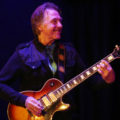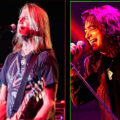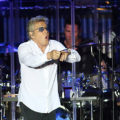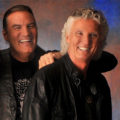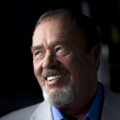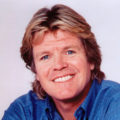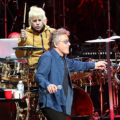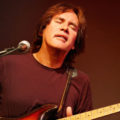Joey Molland breaks down “Be True To Yourself,” being in Badfinger and working with The Beatles
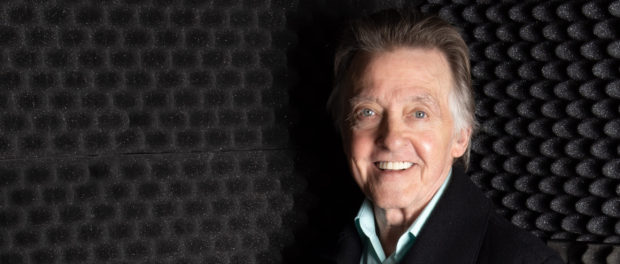 Photos provided by Jim Vasquez
Photos provided by Jim Vasquez
Being the earliest act signed to The Beatles’ Apple Records afforded Badfinger tremendous visibility, but members’ abilities more than spoke for themselves on many occasions.
Not only did the power pop pioneers rack up a heap of smashes (“Come And Get It,” “No Matter What,” “Day After Day,” “Baby Blue,” “Without You”), but they were personally recruited as session musicians by George Harrison and John Lennon for their respective masterpieces, “All Things Must Pass” and “Imagine.”
Though the subsequent years resulted in the tragic passing of principal players Pete Ham, Tom Evans and Mike Gibbins, singer/guitarist Joey Molland never wavered in his commitment to preserving the group’s memory.
In fact, there’s plenty for fans to fawn over throughout a new solo album, “Be True To Yourself,” which he breaks down on a car ride call with Chicago Concert Reviews, alongside remembrances of Badfinger and what The Fab Four were really like behind the scenes.
Let’s talk about the new album’s title, “Be True To Yourself.” Is it your mission statement or wisdom you want to leave with listeners?
Joey Molland: A little bit of both I guess and it’s a title for one of the songs. You know, I haven’t really changed my style so much over the years, so the whole thing works for me.
 What have people been saying after they’ve heard the album?
What have people been saying after they’ve heard the album?
Molland: The reviews in general have been excellent around the world. A lot of people are saying “thanks for putting it out cause you don’t hear records like that anymore.” We did it in a full studio with a full line-up of musicians [prior to the pandemic], who did complete takes of the songs. There’s a difference in that sense and then we have Mark Hudson [Ringo Starr, Aerosmith], one of the greatest producers on the planet…The reviews are unanimous. “It’s a great record.” I’m astounded by that and I’m really rewarded by that…They’re really into it, they listen to it twice in a row and they enjoy it. That’s the idea of music, isn’t it?
Give us a rundown of the special guests, starting with Julian Lennon.
Molland: I met Julian quite a while ago when [a previous] album came out and he wanted to say “hello.” He was really a nice guy, he liked the record and he was lovely. I hadn’t seen him since then, but Mark had seen him around over the years and had gotten quite friendly with him. Mark told Julian I was making a new record cause he liked the old band. “You want to come and do something?” He said “sure,” volunteered to come down and sang on three or four of the songs. It was great to see him and a lot of fun.
You reconnected with Micky Dolenz from The Monkees and Jason Scheff from Chicago after a recent tour together that paid tribute to The Beatles’ “White Album.” Did you have any prior relationship with them?
Molland: I had a slight relationship with Mickey. I’d seen him over the years, but we weren’t friends really, other than musician friends, like “hi, how are you?” On the tour, he heard some of the stuff I was doing and said he would do some harmonies. I happened to be doing the vocals in Los Angeles and asked him to come down. He was happy to do it and that’s what happened there.
Same with Jason Scheff. I’d never met Jason, but he and I became great friends on the tour. He was very helpful to me. I had a bit of a throat problem on the tour and my voice was a bit shabby, so Jason came in with me and really helped me with the vocals for a couple of weeks. He’s an incredible singer. He’s got an amazing voice and an amazing range. He came in and did really strong harmonies for me. At the end of “Rainy Day Man,” I can hear Jason climbing up the harmony and he is stunning.
There’s also have a Wings connection with Steve Holley. Tell us about working with him.
Molland: Yeah, Steve’s fantastic. He’s one of the best drummers I’ve ever played with, if not the best. [He has a] beautiful groove with really powerful, good, strong fills. It was great fun to watch him work on his arrangements and his fills, just a knock out. The whole thing was a wonderful experience for me.
 To what extent did you want the album to hearken back to the days of Badfinger and how much of it is an update on where you’re at now?
To what extent did you want the album to hearken back to the days of Badfinger and how much of it is an update on where you’re at now?
Molland: Well, it is an update on that approach, but it’s the same approach. Songs are genuine, songs are real and about real things…I just hope [listeners] can sing along, it makes sense to them, that it’s a bit of fun and has a little bit of a groove to move around with…We learned the songs in the studio. We did not do any pre-production to them other than what Mark and I did. A bunch of guys came down, we learned the chords and it was easy to record them. Melodically, they’re strong and everybody liked the themes of the songs. It sounds like I’m stroking everybody here, but the fact is all these guys, whether guitar players, organists, the bass parts or the horn section, are great musicians. They’re all professionals and it was a thrill for me.
The group’s hit list speaks for itself with “Come And Get It,” “No Matter What,” “Day After Day,” “Baby Blue” and so on. Did you ever expect them to stand the test of time?
Molland: Not the way it has. We didn’t really know what was gonna happen when we put the songs out. Luckily, those four were really successful for us, as well as the “Without You” song with Harry Chapin doing it and Mariah Carey doing it later on. We’ve had a lot of luck with our songs, no doubt. Peter was really hot at the time. He was the main writer on the big hits. He did so much, it was a shame to lose him.
Do you ever stop to wonder what if things had gone differently or have you managed to keep moving forward?
Molland: Of course I look back. I wish it would’ve gone differently. I wish the band could’ve held itself together. I did everything I could I thought to keep the band together, but it was impossible…I left and that was the end of it for me. I wish we could have. We were good friends, we enjoyed working together and we had a good way of working together. We all choose the songs. Nobody was the leader. We all had the same idea in mind. We wanted to be a better band, as good as we could be. We wanted to sing our hearts out and keep writing good songs. That’s what we wanted to get known for. We used to be kinda paranoid about our live shows. All the American bands seemed better, tighter with stronger singers, but we had some success.
How do you feel about the legacy Badfinger’s left behind?
Molland: I go back and listen to the records and I don’t get embarrassed by them at all. I think they’re good. I think we were straight with our fans. I think they liked the way we played and they liked the way we talked. We were good friends with our fans. We were from England and didn’t know anybody in America, so we’d go out to the car park after the show, say “hello” to people and have a little smoke. We made a lot of great fans that kept us going. We’ve watched them grow up, have families, and they still come out and see the band. It was a great time for us. If you can imagine, we were 22, 23, 24-years-old, just touring the world, playing anywhere and everywhere, selling places out, rocking and rolling man! It was all good.
 How involved were The Beatles in the band’s music during those days or was it more behind the scenes of Apple Records?
How involved were The Beatles in the band’s music during those days or was it more behind the scenes of Apple Records?
Molland: Of course Paul wrote “Come And Get It” for the band. Actually, I joined the band right after they recorded that song. They weren’t really involved in the songwriting at all. When George was working, he helped us a lot with some arranging and helped me out with a couple lyric lines…They encouraged us of course. What kind of influence were they? They were the Beatles after all!
We were huge fans, so we had all their influences and the influence of the actual Beatle group themselves, the way they did things, the harmony parts, nice little guitar bits and the way they got to play less and less on their later records. The guitar players played less, the bass parts got simpler and more melodic. The drums got simpler too. They were really remarkable. How could those guys do that? When you listen to “Come Together” and “Something In The Way She Moves,” which are beautiful, I love to hear the arrangements. They’re just brilliant. I just really enjoyed them from that side of it and we loved their personalities of course.
What was it like guesting on those iconic George Harrison and John Lennon albums?
Molland: They were magic sessions. Everybody was phenomenal. Seeing Ringo playing the drums, or whatever, it was just super. They were really nice guys, not rock stars, just regular guys who got really successful in a rock band. I don’t know if they really ever understood it themselves. They certainly didn’t act like rock stars when we were around them. They were just like normal guys.
Anyway, it was a great experience. I’m talking about all the songs together. Eric Clapton was there, left working out his guitar parts. It was just like a normal band recording, but everybody in the room was a big star. Except for us, we were just a little band. These guys were all giants, but they all acted like normal musicians. They worked their butts off, played the songs through a few times and then we’d get to recording. It was great.
It really speaks to your musical abilities and their appreciation of Badfinger to include you on all of these projects.
Molland: Yeah, it was nice of them to do that! We never thought of it like that. We just hoped we’d be okay for them to play the right parts. They knew what they wanted. After we played a couple of songs with them, then George had us on everything, on all the records. I think he actually was instrumental in getting us on the John Lennon album too. Phil Spector was producing both of them, so we had no objection! We were happy to get the opportunity. Wouldn’t you be knocked out to get a call from John Lennon saying “do you want to come [to the studio]? Bring your guitars over. I’d love you to play on this.” It was like a little miracle lap when those kind of things went on. There were so many musicians around. Every big star in the world wants to play with them, but for some reason, they had us come down and play [laughs].
 Many have said Badfinger was instrumental in starting what we’ve come to know as the power pop movement. Do you feel like that’s the case?
Many have said Badfinger was instrumental in starting what we’ve come to know as the power pop movement. Do you feel like that’s the case?
Molland: I don’t know that we were the founders of it, but we certainly recorded popular music in a very modern way, so maybe in that way we did…We desperately wanted to be able to play the songs live, so we did the back tracks in that way. It wasn’t until we were actually produced by George and Todd Rundgren that the arrangements got a little bit taken away from us in terms of loads of overdubs and all that stuff. We simply couldn’t play the songs anymore.
What were their production techniques?
Molland: When George produced, he really rearranged the songs. I had a song on the “Straight Up” album called “Suitcase,” which was a rhythm and blues, rock and roll song about being on tour. They thought it might be a hit song and they decided to rearrange it. The next thing you know, there was no real rock and roll electric guitar in it anymore, which is kind of disappointing, but the arrangement worked and a lot of people liked it, things like that.
It was difficult to reproduce a record, like we couldn’t do “Day After Day” on stage. There were just too many guitar parts on it and too many vocals on it. There were only three of us singing, but we had like eight tracks of vocals with “ohhs” and “ahhs,” and loads of acoustics all over the place, so all those things made it more and more difficult to be a live band. I know for a long while we didn’t do “Day After Day.” We can do a four-man version of it, but it was difficult. It just made it harder for us in terms of how we played. “Baby Blue” was just a four-piece band. All we overdubbed on it was one acoustic and the lead guitar part.
Why is it important for you to continue leading live versions of Joey Molland’s Badfinger?
Molland: A couple of reasons, one being I’m the only one that was in the band that’s still alive. I don’t want to call it Badfinger because it’s not. But it is Joey Molland’s Badfinger because I direct how the music goes, what songs we do and I try to bring those songs to life. When I call the band Joey Molland’s Badfinger, some promoters like that, so they pay me a bit more money. Really that’s what I call it when we’re doing Badfinger shows. I also do Joey Molland storyteller shows and acoustic shows. I play with my friends when they’re around. I’m doing a record with a friend of mine right now, Brian Jentges, who is from the area right here [in Minnesota]. I play all over the place and I play all different things.
Do you have any memories of visiting and playing in Chicago?
Molland: Oh, loads of times I recall going to Chicago when I was a boy, going up to Flagg Bros. and doing some shopping there. I remember going to the guitar gallery, checking out cellos and buying a couple of things. I’ve had great times in Chicago. As a matter of fact, my younger son Shaun lives in Chicago now. He’s a cook in Chicago. It’s hard for me to remember the names of the gigs, but I remember we played there a lot. I know we played at Soldier Field with Peter Frampton in 1976. I’ve played all sizes. I played the Hard Rock a little while ago. The City Winery was nice. I’ve done loads of club gigs around there. I’ve played Palatine and I’ve played at the Arcada Theatre. It’s a beautiful place. I always have a great time and the people are great to us. They’ve always liked the old Badfinger stuff. It’s a good rock and blues city man!
For additional information on Joey Molland, visit BadfingerSite.com.

